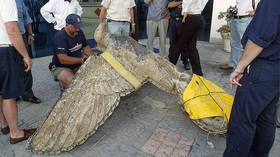Jewish human rights group urges Uruguay to sell NAZI eagle to museum to prevent purchase by Hitler admirers

A symbol of Nazi Germany – an eagle holding a swastika in its talons – should not fall into the hands of Hitler devotees and should instead go to a public-owned museum, the Simon Wiesenthal Center in Los Angeles has urged.
The two-meter eagle, weighing about 400kg, was recovered from the German World War Two battleship Admiral Graf Spee off the coast of Uruguay in 2006 by a group of enthusiasts.
The ship was sunk in December 1939 by its crew to prevent her from falling into British hands.
The Simon Wiesenthal Center said that, if the eagle is sold to private buyers, they must be advised that Nazi paraphernalia should not be publicly displayed unless “the display of these symbols [serves] as a warning to future generations of what should never be repeated.”
“German authorities and the Wiesenthal Center have taken the position that such artifacts can not serve a growing extreme right market and white supremacists,” the Center's Dr Shimon Samuels said in a statement.
Also on rt.com British museums accused of hypocrisy over BLM support, as charity boss likens colonial art to Nazi-looted artefactsSince its recovery, the statue has been gathering dust in a warehouse owned by the Uruguay Navy, waiting for someone to finally claim ownership of it. The eagle was briefly put on display in Montevideo as a tourist attraction, but it was removed after Germany protested. The eagle's estimated price hovers at around $26 million.
The artifact has been a matter of controversy in Uruguay ever since its recovery. The country's Supreme Court ruled in 2014 that if the eagle were ever to be sold, the profits should be divided between the state and the private company that recovered it from the bottom of the sea. Eventually, a local court ruled in 2019 that the symbol of the Third Reich should be auctioned off.
The Simon Wiesenthal Center is a global human rights organization researching the Holocaust and confronting anti-Semitism, hate and terrorism.
Like this story? Share it with a friend!















